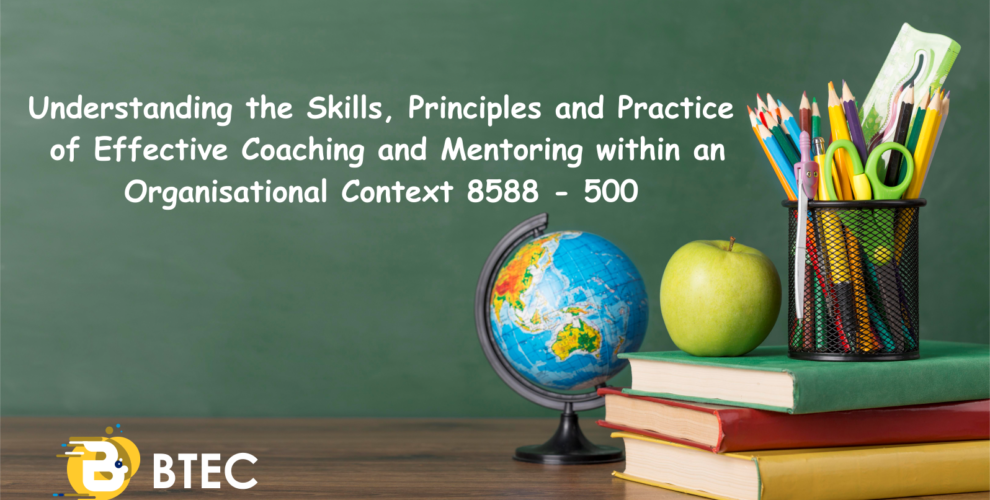About This Unit
This Unit is a significant step in completing the requirements necessary to receive a diploma from the Institute of Leadership and Management (ILM). It is the first of three units necessary to earn an ILM level 5 qualification. It aims at providing the learners with an awareness of the abilities, values, and techniques necessary for successful coaching or mentoring within an organisational environment. There are six credit values and 20 hours of general education required. This covers unit delivery, orientation, and tutorial support. The certification is designed to match the individual needs of the learner, and the guided learning hours consist of a mixture of workshops, online resources, in-person tutorials, and telephone coaching.
What You Will Learn
In completing this course the learner will recognize the aims of coaching and mentoring within the framework of an organization. By the end of the unit learner will be in a position to explain the context of coaching and mentoring within and organisation by outlining their similarities and differences. This will enable the learner to present the business case for employing coaching or mentoring to help individuals and institutions. The learner will also assess how the company context influences coaching or mentoring. By examining the methods for measuring the effects of coaching or mentoring for both individuals and organization, the learner will be in a position to Identify potential obstacles to mentoring or coaching and create ways to minimize these obstacles. The learner will also be in a position to review the behaviours, knowledge, and skills needed to be a successful coach or mentor. Examining the communication abilities a successful coach or mentor must possess is an important step that the learner will take to develop soft skills to become and effective coach and/or mentor. The learner will also examine the mentor’s or coach’s obligations to effectively manage the relationships they will encounter. All these will enable the learner to not only complete the unit successfully but also become a fully-fledged coach and mentor.
This Unit is Suitable for Persons Who
This unit is suitable for managers who have major daily responsibility for coaching and mentoring. It is also a right fit for learners who want to pursue a career in offering freelance services as coach or mentor or transition into a development post. It is also beneficial for those who desire to acquire a critical comprehension of the obligations of the professional coach and mentor as it helps them increase your knowledge of the positive effects coaching and mentoring can have on a company. It is also adequate for a coach or mentor, who seeks to evaluate their own abilities, attitudes, and expertise. The certification is also an asset in demonstrating an individual’s professional growth as a coach and mentor and also help individuals consider their future development. It can also help organizations, in planning, delivering, and evaluating their coaching and mentoring programs and the benefits it might have for the business. It can also help businesses ensure that the managers in training as mentors or coaches have the necessary knowledge, abilities, and ethical perspectives. Finally, it can be beneficial to organisations by helping them create a culture of coaching and mentoring inside their business to help managers to effectively support the growth of others and enhance their performance.
Learning Outcomes
After completing this unit, learners will be able to meet the three main learning outcomes as shown below. These outcomes are further divided into a number of sub-divisions. The learning outcomes will enable them to Evaluate:
- Understand the purpose of coaching and mentoring within an organisational context (Learning outcome 1).
- Understand the knowledge, skills and behaviors required to be an effective coach or mentor (Learning outcome 2).
- Understand the importance of effective contracting and management of the coaching or mentoring process (Learning outcome 3).
What are the Entry Requirements?
This unit is one of the three mandatory units for completing ILM level 5. The entry requirements for the unit vary with most institutions although the main requirement is a payment of approximately £ 1900 to cover the course completion for a period of about one year although there exists other options to complete it within 2 years. This payment can be made in full although most organisation offer a payment plans and payment holidays to help learners who cannot pay the whole amount up-front make the payment in instalments. This allows learners to start training as soon the first deposit is made. The amount paid is to help cover the course for the entire period, Membership of the Association for Coaching for one year, access to learning resources, unlimited phone and email support, and peer co-coaching triads and ILM online access to a multitude of coaching tools among other resources that may vary per institution. The student is expected to then complete an enrolment form that highlights a summary of current work experience and their goals for attending the programme. This information assists most organisation in designing a programme that meets the client’s needs and aspirations for the level. The learner can complete the level as either an award, a certificate or a diploma each with allocated and varying time scale and also varying cost. The learner can then select the method they deem fit to complete the unit whether it is through attending training or through distance learning where they can receiving learning resources via webinars and websites. These options also vary depending on the institution.
How We Can Help
You may find it difficult and time-consuming to participate in other academic and social activities while pursuing an ILM degree. You can count on us to provide you with knowledgeable specialist writers who are conversant with the subject area when need help with an ILM project. They will ensure you understand everything you need to know to achieve those grades you desire. The main goal of our website is to give students access to a beneficial tool that will help them achieve their academic and career goals. Our experts put in the extra effort and time required to perform exhaustive research for your Leading Project implementation assignments so that you can be certain you will receive the marks you desire. If you use our service, you can be assured that you will not fail, which means that we will save you a significant amount of money on retakes. In addition to this, we make certain that each and every task is finished on time. No matter how soon the deadline is approaching, we can assure that you will deliver the paper before any penalties are issued. Furthermore, you can relax knowing that the standard of your project will not suffer in the event that we are given a request at the eleventh hour. We have a stringent policy against plagiarism; hence we guarantee to deliver original content that is one hundred per cent unique to each of our customers.
Before delivering any work to you, we make certain that our ILM assignment-help experts put them through a range of plagiarism detection software to verify that they are original. We exist to contribute to the academic development of our clients. Because of this, we only engage individuals who have substantial prior experience working within the ILM curriculum; consequently, you will have the peace of mind that comes along with knowing that your study will be meticulously documented. No matter what level of the ILM you are working on, our writers will utilize their extensive expertise as well as their thorough knowledge of the subject area to satisfy the requirements and standards of the test. We understand that Students typically have limited financial resources at their disposal. Hence, we strive to provide price plans that are as adaptable as possible to fit a variety of budgets. Because we want students of all different socioeconomic backgrounds to be able to make use of our services, the prices that we charge for providing assistance with ILM assignments are kept to a minimum. The ILM assignment assistance writers are available to edit the project at no additional cost to you if you are dissatisfied with the final product. We also offer editing and proofreading services, and we would be pleased to assess your work and make any necessary modifications. So do not be hesitant to call or email us if you have any questions. Our customer care team is here to assist you with any questions you may have about your assignments at any time of the day or night. We want to help you, and we’re ready to do so.
Resources Used for the Unit
There are various publications that are provided for learners wanting to pursue this unit. The following are a few of them that are widely used by institutions all over the world.
Athanasopoulou, A., & Dopson, S. (2018). A systematic review of executive coaching outcomes: Is it the journey or the destination that matters the most? The Leadership Quarterly, 29(1), 70-88.
Bagdadli, S., & Gianecchini, M. (2019). Organizational career management practices and objective career success: A systematic review and framework. Human Resource Management Review, 29(3), 353-370.
Bush, T., Coleman, M., Wall, D., & West-Burnham, J. (2018). Mentoring and continuing professional development. In Mentors in schools (pp. 121-143). Routledge.
DiGirolamo, J. A., & Tkach, J. T. (2019). An exploration of managers and leaders using coaching skills. Consulting Psychology Journal: Practice and Research, 71(3), 195.
Garvey, B., Garvey, R., & Stokes, P. (2021). Coaching and mentoring: Theory and practice. Sage.
Hastings, L. J., & Kane, C. (2018). Distinguishing mentoring, coaching, and advising for leadership development. New directions for student leadership, 2018(158), 9-22.
Mullen, C. A., & Klimaitis, C. C. (2021). Defining mentoring: a literature review of issues, types, and applications. Annals of the New York Academy of Sciences, 1483(1), 19-35.
Roberts, A., Storm, M., & Flynn, S. (2019). Workplace mentoring of degree apprentices: developing principles for practice. Higher Education, Skills and Work-Based Learning.
Schermuly, C. C., & Graßmann, C. (2019). A literature review on negative effects of coaching–what we know and what we need to know. Coaching: An International Journal of Theory, Research and Practice, 12(1), 39-66.
Sekerin, V. D., Gaisina, L. M., Shutov, N. V., Abdrakhmanov, N. K., & Valitova, N. E. (2018). Improving the quality of competence-oriented training of personnel at industrial enterprises. Calitatea, 19(165), 68-72.
Stokes, P., Fatien Diochon, P., & Otter, K. (2021). “Two sides of the same coin?” Coaching and mentoring and the agentic role of context. Annals of the New York Academy of Sciences, 1483(1), 142-152.





